Alan MacLeod on Nicolas Maduro versus U.S. election interference.
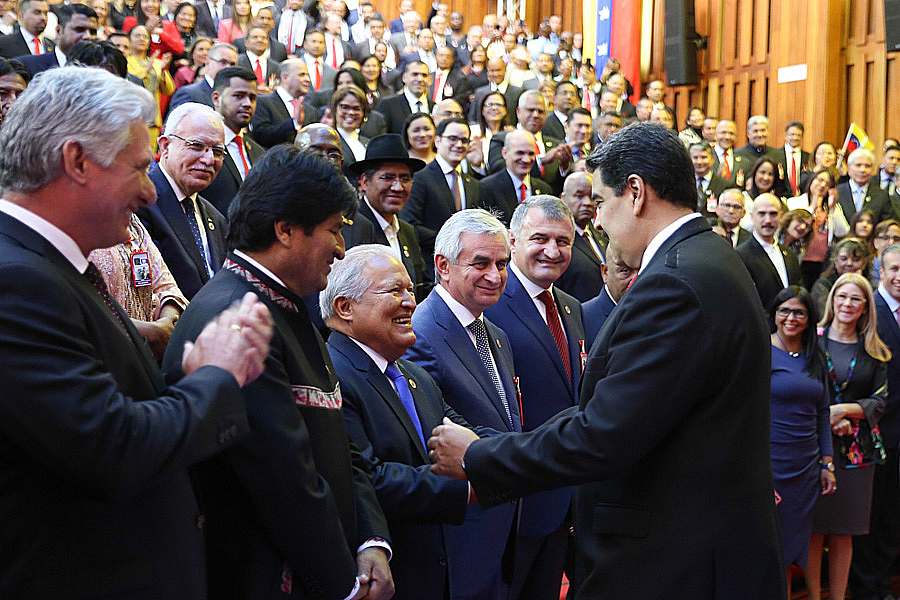
Foreign leaders greeting Venezuelan President Nicolas Maduro at his second inauguration, Jan. 10, 2019. (Presidencia El Salvador CC0, Wikimedia Commons)
By Alan MacLeod
MintPress News
 With upcoming elections scheduled for July 28, the United States is working overtime to dislodge the socialist government of Nicolás Maduro. Ten individuals are vying for the position, including nine in opposition to Maduro, who heads a coalition of 13 leftist groups.
With upcoming elections scheduled for July 28, the United States is working overtime to dislodge the socialist government of Nicolás Maduro. Ten individuals are vying for the position, including nine in opposition to Maduro, who heads a coalition of 13 leftist groups.
Washington, though, has made clear that its preferred candidate is 74-year-old retired diplomat Edmundo González, and is spending big, bankrolling a myriad of opposition organizations, from political parties to NGOs and media outlets, all with the same goal in mind: ousting Maduro and returning Venezuela into the U.S. sphere of influence.
The U.S. is also continuing its campaign of economic warfare against the country, with crushing sanctions designed to make the economy scream and foster domestic resentment towards the Maduro administration. Its reason for doing so is that, since 1998, Venezuela has offered a different political and development model and has been a leading anti-imperialist force, opposing U.S. actions and serving as one of the loudest critics of Israel, who Maduro recently accused of carrying out one of the worst genocides since the Second World War.
Running Interference
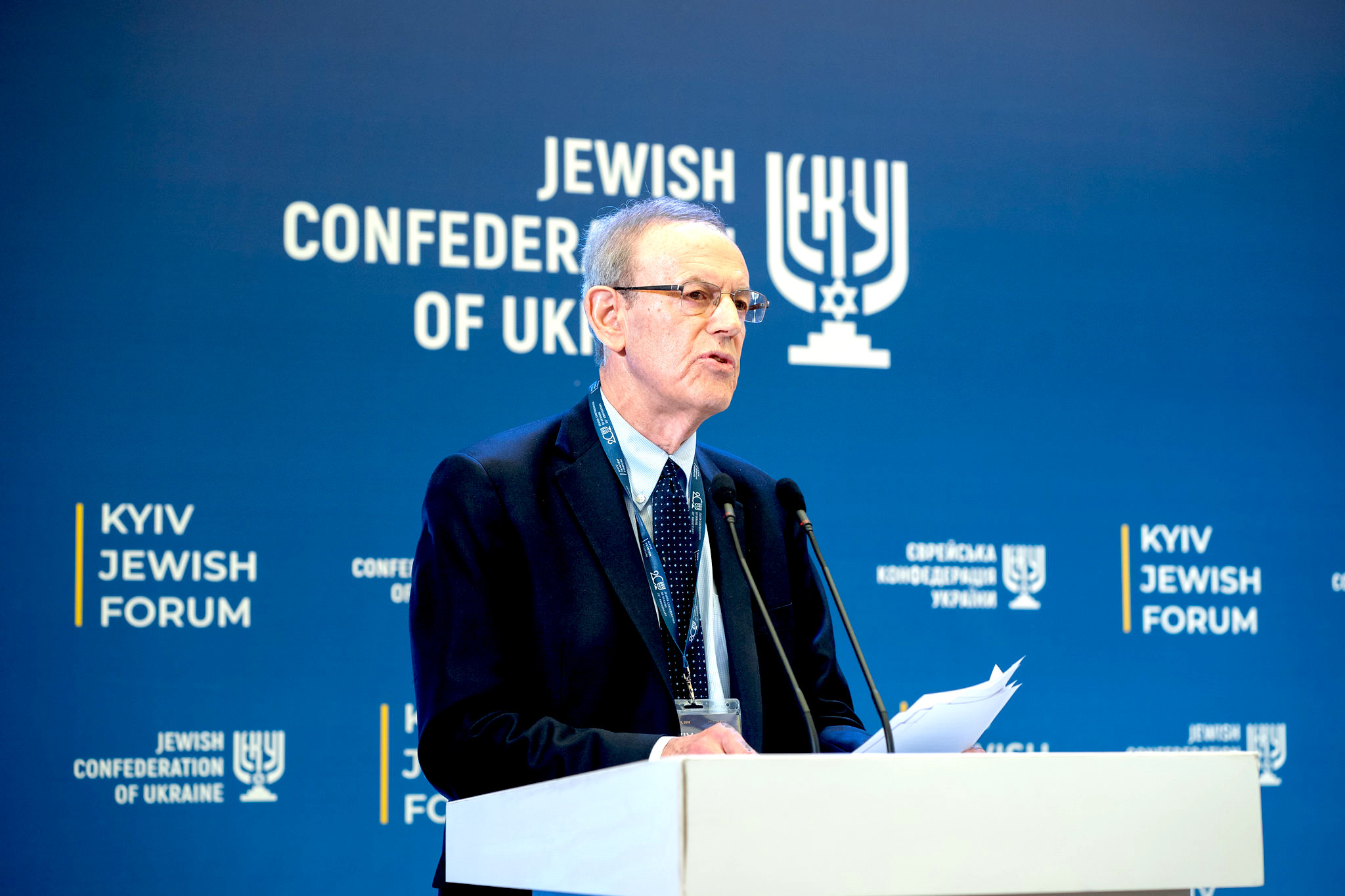
Carl Gershman, president of the National Endowment for Democracy, addressing the Kiev Jewish Forum in 2019. (Boris Lozhkin, Flickr, Public domain)
The primary vehicle through which the U.S. supports overseas groups is the National Endowment for Democracy (NED). Since President Hugo Chavez’s election in 1998, the United States has spent tens, if not hundreds, of millions of dollars on “democracy promotion” in the country.
For example, the NED’s latest published country report notes that it spent over $100,000 sponsoring a program called “Food Security and the Transition to Democracy,” which consisted of “foster[ing] a network of activists, intellectuals and citizens” who could act as leaders for a “democratic transition.” Since the United States is one of only a handful of countries that fails to recognize the legitimacy of the government of Venezuela, it is clear that this would involve regime change.
A second grant, this time for over $180,000, is designed to “enhance the leadership, organizational, and networking capacity of youth to engage in the recovery of democracy; and to foster international solidarity by raising the profiles and voices of youth leaders” – in other words, to train a generation of pro-U.S. political leaders to challenge and overthrow the government.
Much of the local Venezuelan media is also financed by Washington, and the NED report details numerous projects promoting pro-U.S. anti-government messaging. From schemes “disseminating independent information to citizens and activists” to “strengthen[ing] independent media and overcom[ing] government censorship” and “expanding independent news coverage,” Washington’s money has bolstered and promoted oppositional groups for more than twenty years. The NED, however, refuses to divulge any of the names of the Venezuelan groups it funds.
Founded in 1983 after a series of public scandals that seriously undermined the image of the C.I.A., the National Endowment for Democracy was explicitly designed as a cutout organization that could do much of the agency’s most controversial work. This includes overthrowing foreign governments. “It would be terrible for democratic groups around the world to be seen as subsidized by the CIA,” NED President Carl Gershman explained. “A lot of what we do today was done covertly 25 years ago by the CIA,” NED co-founder Allen Weinstein added.
Recently, NED projects have included channeling money to the leaders of the Hong Kong Protest movement, fomenting a nationwide protest campaign against the Cuban government, and attempting to overthrow the Lukashenko administration in Belarus.
Our Man in Caracas
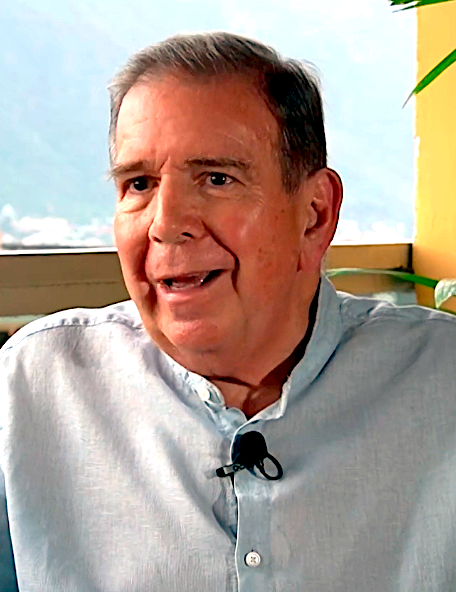
Edmundo González in May 2024. (Voz de América, Wikimedia Commons, Public domain)
Although nine opposition political figures are standing for president, González has been anointed by the primary right-wing coalition and the U.S. government. In many ways, he is a surprising choice; a long-retired diplomat, he was almost entirely unknown inside Venezuela before his nomination. His most recent post was as ambassador to Argentina, which he was forced to leave in 2002 after he publicly supported a U.S.-backed far-right coup against Maduro’s predecessor, Hugo Chavez.
In addition to Washington’s support, González also has the full backing of Western corporate media. CNN, for example, describes him as a wildly popular “quiet, bird-loving grandfather,” full of “poise and calm,” which supporters see as “a grandfather-of-the-nation type figure who could usher in a new era after the political violence of the last decade.” It does not mention why González has not held a diplomatic post since 2002, but it does suggest that if the “authoritarian” Maduro loses the popular vote, he will refuse to leave office.
In reality, Maduro has repeatedly stated that he will respect the electorate’s choice, no matter what. “I believe in the electoral system, I believe in Venezuelan democracy, I believe in the people, in deep and true democracy. I’m ready,” he said.
González, in contrast, has refused to do the same. The government has immediately accepted its electoral defeats, such as the 2007 constitutional referendum or the 2015 parliamentary elections. The opposition, however, has, time and again, refused to accept any election loss, often using the moment to launch coup attempts or waves of violence across the country.
Vice-President of Maduro’s United Socialist Party, Diosdado Cabello, recently asserted that González had, since the 1980s, been an asset of the Central Intelligence Agency, although he provided little hard evidence.
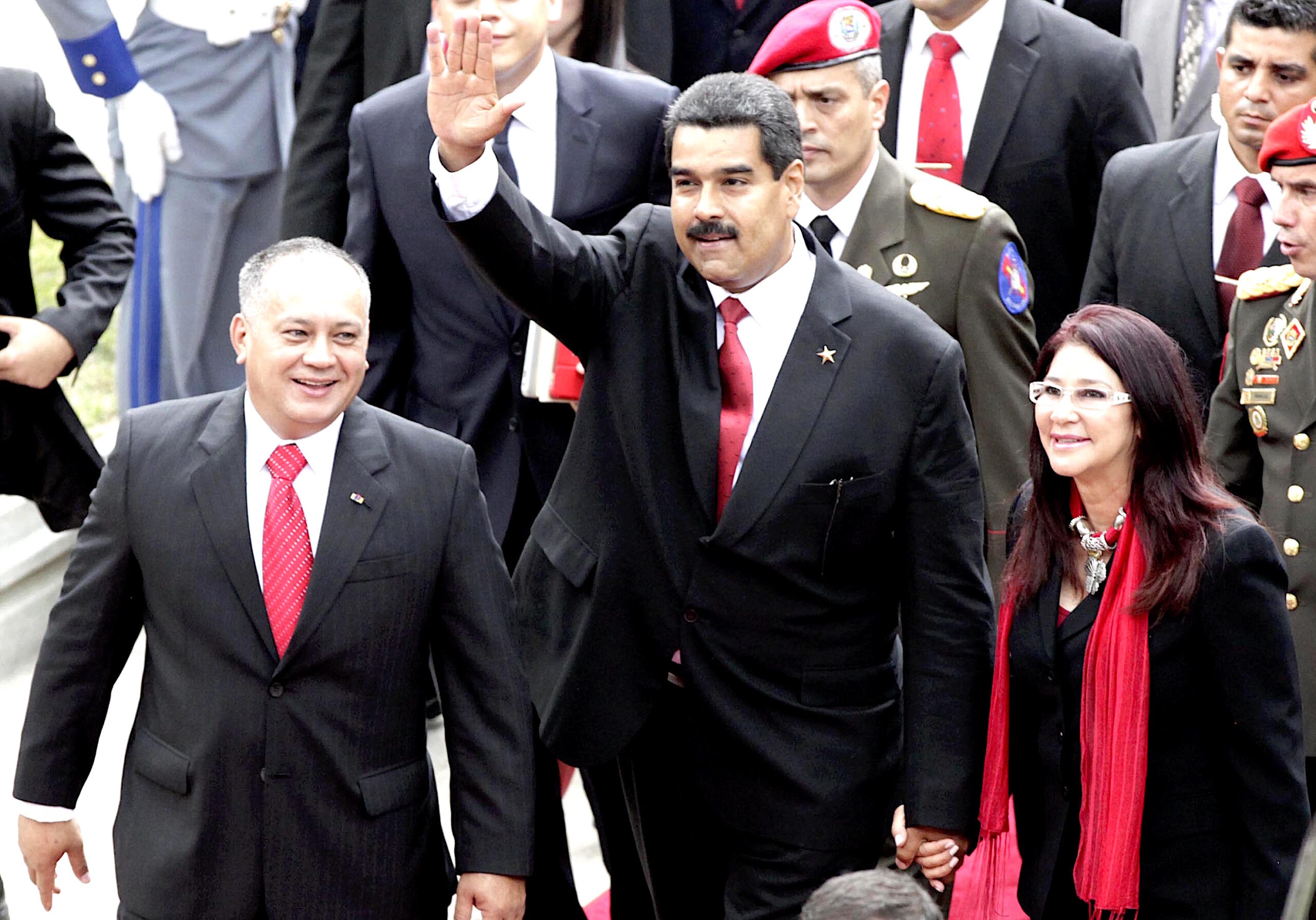
Diosdado Cabello with Maduro and Cilia Flores in 2013. (Cancillería del Ecuador, Flickr, Wikimedia Commons, CC BY-SA 2.0)
While González’s name is on the ballot, it is widely understood that he is a frontman for Maria Corina Machado, a U.S.-backed politician who was banned from holding political office after a series of corruption scandals and for her support for U.S. intervention. Machado has been campaigning energetically across the country for González, often carrying a large picture of his face. Yet she has also stated that she would pull the strings if he were elected.
“Edmundo González looks way too old and frail to be a serious candidate. Perversely, it seems to be why Maria Corina Machado chose him as her stand-in. She has been on the campaign trail for him, not bothering to hide that she would be the real winner if González prevails,” Joe Emersberger, co-author of Extraordinary Threat: The U.S. Empire, the Media, and Twenty Years of Coup Attempts in Venezuela, told MintPress.
Born into one of Venezuela’s most elite and well-connected families, Machado attended the prestigious Yale University, as did President George W. Bush, who welcomed her to the Oval Office in 2005 for an official visit.
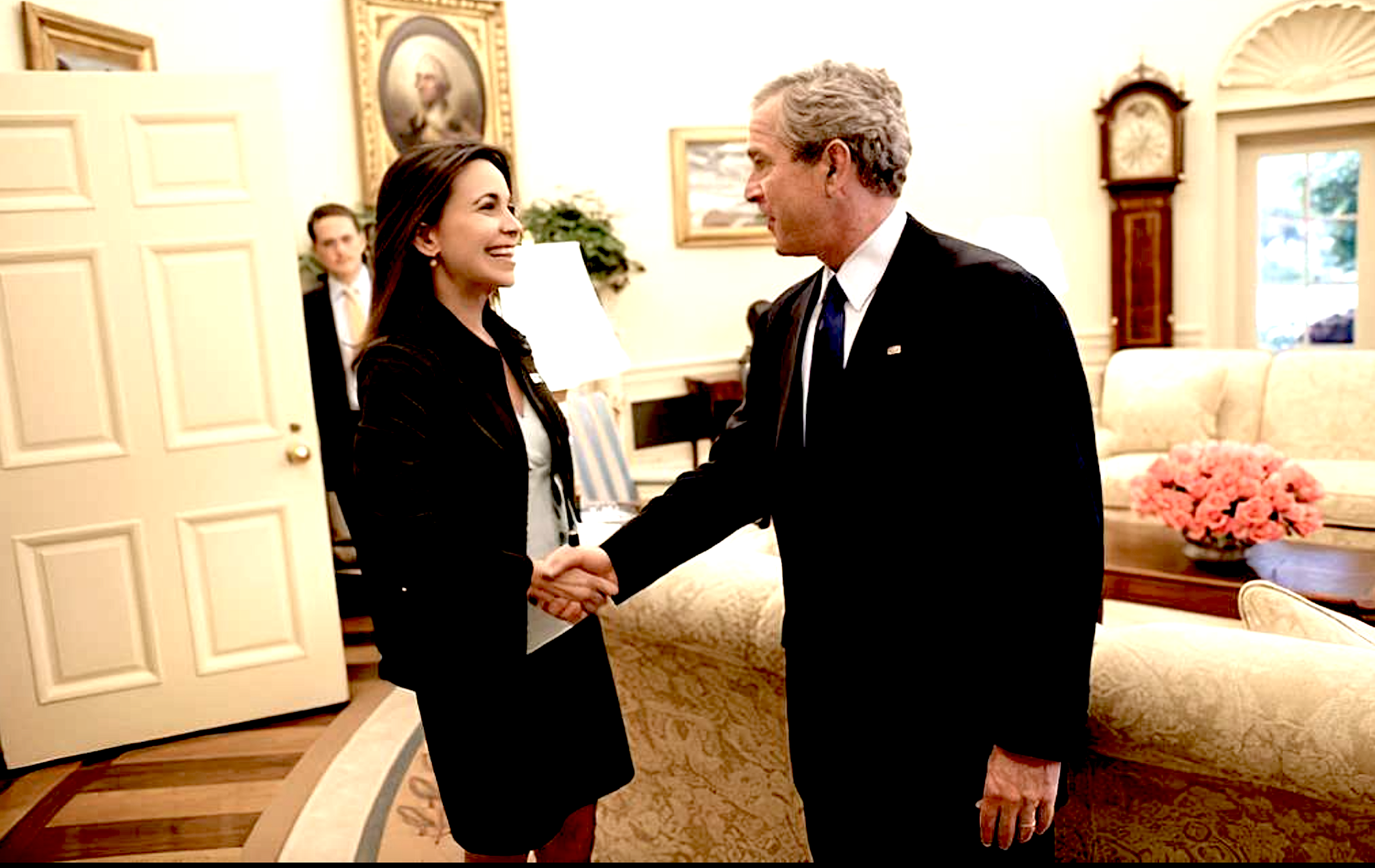
Bush welcoming Machado to the Oval Office in 2005. (Eric Draper, White House, Wikimedia Commons, Public domain)
Unlike others in the Venezuelan opposition, Machado has openly received money from the National Endowment for Democracy. Her election monitoring organization, Súmate, was, for many years, bankrolled by the CIA front group. WikiLeaks cables reveal that the U.S. Ambassador in Caracas considered this a serious drawback to its credibility.
In addition to an American-funded attempt to remove President Chavez (1998-2013) from office with a recall referendum, Machado led a 2014 campaign of guarimbas – violent street protests that targeted infrastructure such as hospitals, schools, universities and the subway. Forty-three people were killed, including two publicly beheaded by protestors. Like González, she also signed a decree endorsing the 2002 coup.
“Maria Corina Machado represents not so much the right but the far right. She advocates for mass privatization and a laissez-faire state, as well as a crusade against the left, just like [Argentinian President Javier] Milei and other far right leaders,” Steve Ellner, professor emeritus of economic history and political science at the University of Oriente, Venezuela, told MintPress.
In Western media, she is portrayed as a persecuted saint or an “enormously popular” “rock star” of a politician. Yet, inside Venezuela, she remains a deeply controversial figure. This is true, even among the opposition coalition. Manuel Rosales, governor of Zulia state and 2006 opposition presidential candidate, for instance, not so cryptically shared his criticisms of the Machado strain in the opposition, stating:
There are leaders who do not believe in the electoral route, who believe in magic, that one day the Marines are going to come to save Venezuela, who believe that by not voting we will be able to oust the government, or that by the way of violence we will overthrow them, which has always failed.”
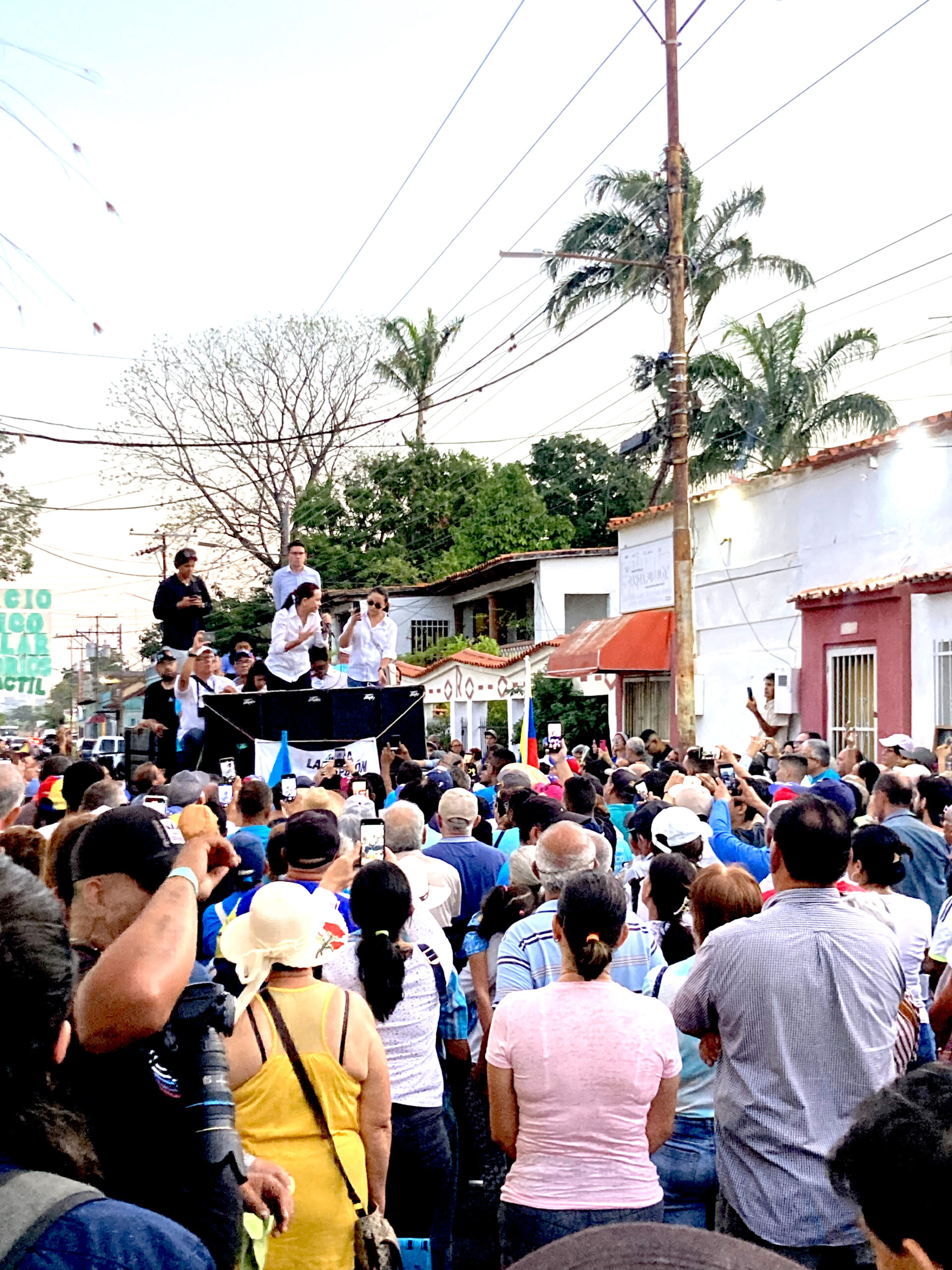
Presidential candidate María Corina Machado during a rally in May 2023 in San Diego, Carabobo, Venezuela. (SantanaZ, Wikimedia Commons, CC BY-SA 4.0)
The Israeli Connection
Machado has consistently endorsed foreign intervention in Venezuela, not only from the United States but from any nation with a conservative agenda. In 2018, for instance, she sent a letter addressed to Israeli Prime Minister Benjamin Netanyahu, asking for an Israeli military intervention, writing:
Our population is suffering from the widespread and systematic attack of the current regime. Its criminal nature, closely linked to drug trafficking and terrorism, represents a real threat to other countries, including and especially to Israel. The current regime…closely collaborates with Iran and extremist groups, which, as we all know, threaten Israel in an existential way.”
“A Venezuela renewed in its prosperity and democratic tradition will cultivate a close relationship with Israel,” she promised.
If Maduro is unseated in July, some of the loudest applause will come from Tel Aviv. The bus driver turned politician has proven to be one of the staunchest international critics of Israel and supporters of Palestine. “Israel is committing massacres in the Gaza Strip in front of the world’s eyes without anyone deterring it,” he said, claiming that Israel’s actions constitute some of the worst barbarity seen since the days of Adolf Hitler. Maduro went on to condemn the European Union as “accomplices” in genocide. Despite its own problematic economic situation, Venezuela has sent tons of aid to Gaza, including food, oil, drinking water, medical supplies, water pumps and mattresses.
Venezuela has long had a fraught relationship with Israel. In 2006, President Chavez expelled the Israeli ambassador over its attack on Lebanon. Three years later, amid a fresh Israeli attack on its neighbor, Venezuela cut all diplomatic ties and recognized the State of Palestine. “Damn you, State of Israel!” he bellowed in a now-famous speech where he denounced it as a terrorist state entity. Both Chavez and Maduro also deepened Venezuela’s economic, political and cultural ties with Iran.
Israel, meanwhile, has shot back. It was one of the first nations to recognize self-proclaimed U.S.-backed politician Juan Guaidó as Venezuela’s legitimate president. “Israel joins our many allies in the hemisphere in welcoming Venezuela back to the bloc of Western democratic nations that oppose despots and oppression. The people of Venezuela look forward to the reestablishment of diplomatic relations with Israel,” Prime Minister Netanyahu wrote on Twitter, just days after Guaidó announced himself to the world.
Thank you,Prime Minister @netanyahu. Israel joins our many allies in the hemisphere in welcoming Venezuela back to the bloc of Western democratic nations that oppose despots and oppression.The people of Vzla look forward to the reestablishment of diplomatic relations with Israel. https://t.co/bbNVPbwiUN
— María Corina Machado (@MariaCorinaYA) January 27, 2019
This endorsement galvanized much of the Venezuelan opposition. Many look to Israel as a guiding light and see parallels between their political projects. “Venezuela’s struggle is Israel’s struggle,” Machado said, explaining that they both stand for “Western values” in the face of opponents who seek to “sow terror, devastation and violence.” Machado has consistently supported Israeli actions since Oct. 7.
Less known, however, is that in 2020, Machado signed a cooperation agreement with the Likud Party. The deal sees Machado’s Vente Venezuela Party working with Netanyahu on a wide range of “political, ideological and social issues, as well as making progress on issues related to strategy, geopolitics and security.”
Campaigns of Terror
The United States has consistently preferred the more radical, far-right factions over more conciliationist groups within the opposition. Only last year did it drop its support for Guaidó, long after other nations began distancing themselves from the “interim president.”
A previously obscure figure, Guaidó shocked the world in January 2019 when he declared himself the rightful ruler of Venezuela despite never standing for president. The U.S. and Israel quickly recognized him.
It is now known that the stunt was planned in the U.S. Guaidó had previously met with Vice President Mike Pence and assured him that he had the support of over half of the Venezuelan military. Yet when the U.S. repeated Guaidó’s calls for the army to rebel and for the people to flood the streets, the response was disbelief and amusement.

President Donald J. Trump with Guaido at White House, Feb. 5, 2020. (White House, Tia Dufour)
Guaidó, who had received NED training since 2007, tried three coups in 2019, each less convincing than the last. Despite its failures, the following year, the United States attempted something even more desperate: an amphibious invasion of Venezuela led by ex-Green Berets. The plan was for ex-Special Forces members to lead an army of some 300 pro-Guaidó troops and shoot their way into the Miraflores Presidential Palace. At this point, the Venezuelan Army would desert or surrender, the government would fall, and Guaidó would be proclaimed dictator.
The scheme, however, fell apart at the first sign of resistance, as the American mission’s leaders were overpowered by members of a local fishing collective armed with nothing more than antiquated revolvers and fishing knives. The Venezuelan Navy intercepted others.
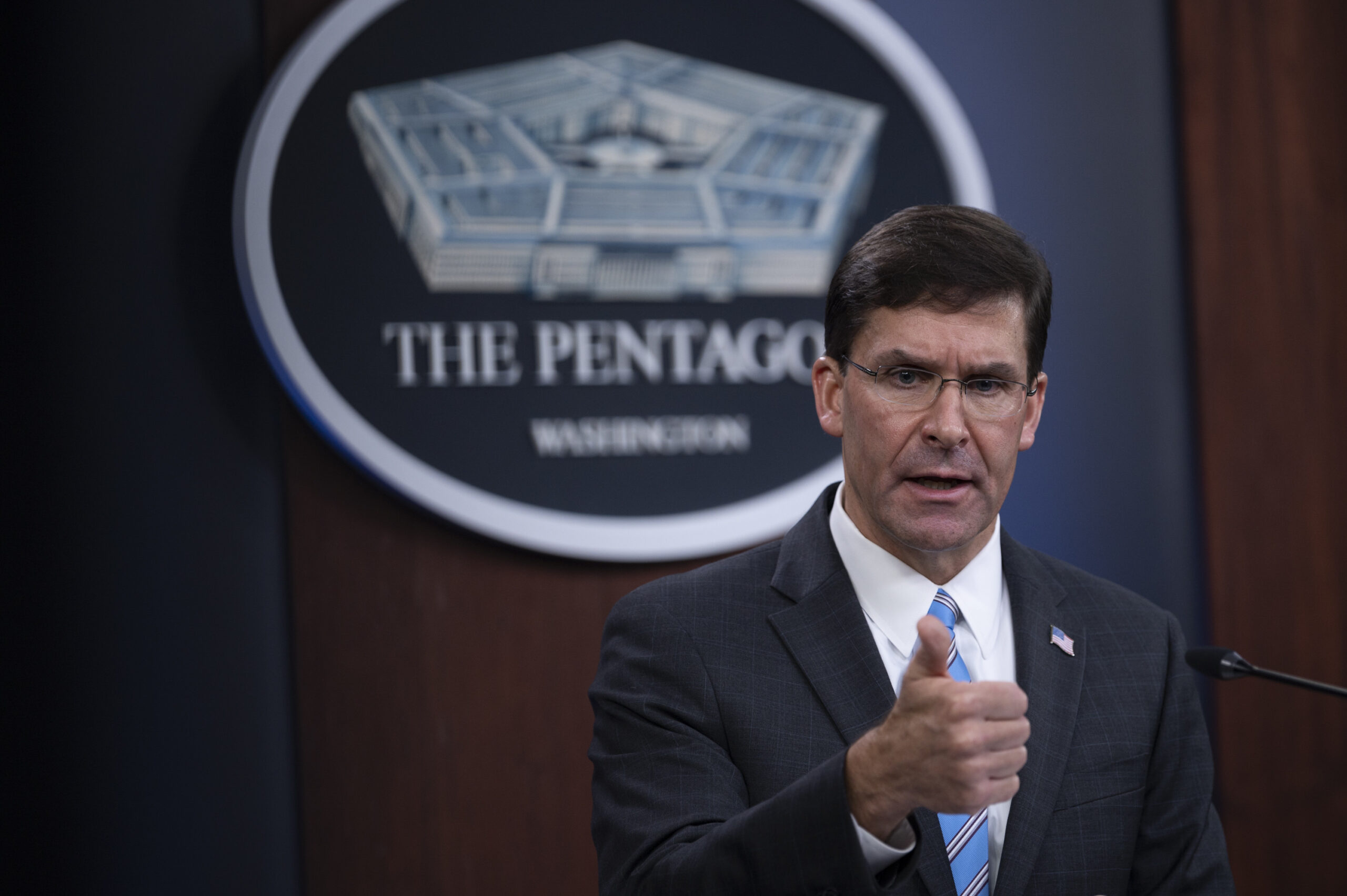
Secretary of Defense Mark T. Esper in July 2020. (DoD, Chad J.McNeeley)
later revealed that the Trump administration was intimately involved in the planning of the operation, dubbed by many as Trump’s “Bay of Piglets.” Guaidó now resides in Miami.
Esper’s memoir, A Sacred Oath: Memoirs of a Secretary of Defense During Extraordinary Times, claimed that Trump was “fixated” on the idea of an Iraq-style invasion of Venezuela. “What if the U.S. military went down there and got rid of Maduro?” the 45th president asked Guaidó.
Esper’s account aligns with that of Trump’s National Security Advisor John Bolton, who claimed that Trump told him that it would be really “cool” to take Venezuela because it is “really part of the United States.”
Esper, however, felt an invasion would backfire and instead proposed raising a mercenary army to carry out an insurgent war against the country along the lines of what the U.S. did in Nicaragua in the 1980s. Others advocated for carrying out waves of terror attacks on Venezuelan civilian infrastructure – something that sheds new light on several suspicious explosions, fires, blackouts and other mishaps inside Venezuela that Maduro had long blamed on the United States.
Just weeks after the Trump/Esper meeting, a former C.I.A. operative was arrested outside Venezuela’s largest oil refinery. The items on his person at the time included a submachine gun, a grenade launcher, four blocks of C4 explosives, a satellite phone, and stacks of U.S. dollars. Authorities claimed they had foiled another U.S. terror attack. The total lack of corporate media interest in the story of an American standing trial for terrorism in Venezuela only confirmed many people’s suspicions.
Maduro was also the victim of a (failed) assassination attempt in 2018, as drones filled with explosives attacked the president at a public event. He later directly accused Bolton of masterminding the attack.
While many in the United States considered the accusation outlandish, Washington did not help itself when, two years later, it placed a gigantic cash bounty on Maduro’s head. The State Department and the Drugs Enforcement Administration offered $15 million for information leading to the arrest or conviction of Maduro, whom they claimed had turned Venezuela into a “narco-state.”
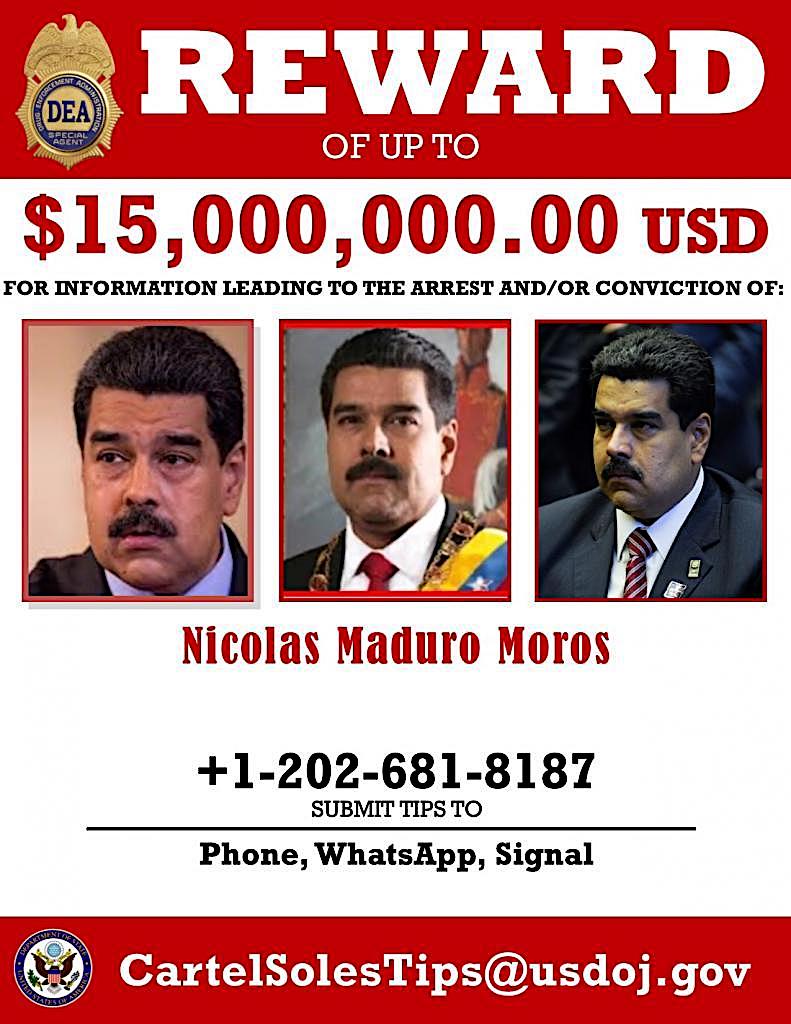
(DEA, Wikimedia Commons, Public domain)
Yet DEA reports on Latin American drug trafficking barely even mention Venezuela as a problem. At the same time, the U.S. Coast Guard’s studies show that the overwhelming majority of illicit Latin American drugs ending up in the U.S. come from Colombia or Ecuador.
Despite this, the DEA spent years sending undercover operatives into Venezuela in an attempt to build a case against Maduro — a plan U.S. officials acknowledged from the start was brazenly illegal.
Coups, Coups & More Coups
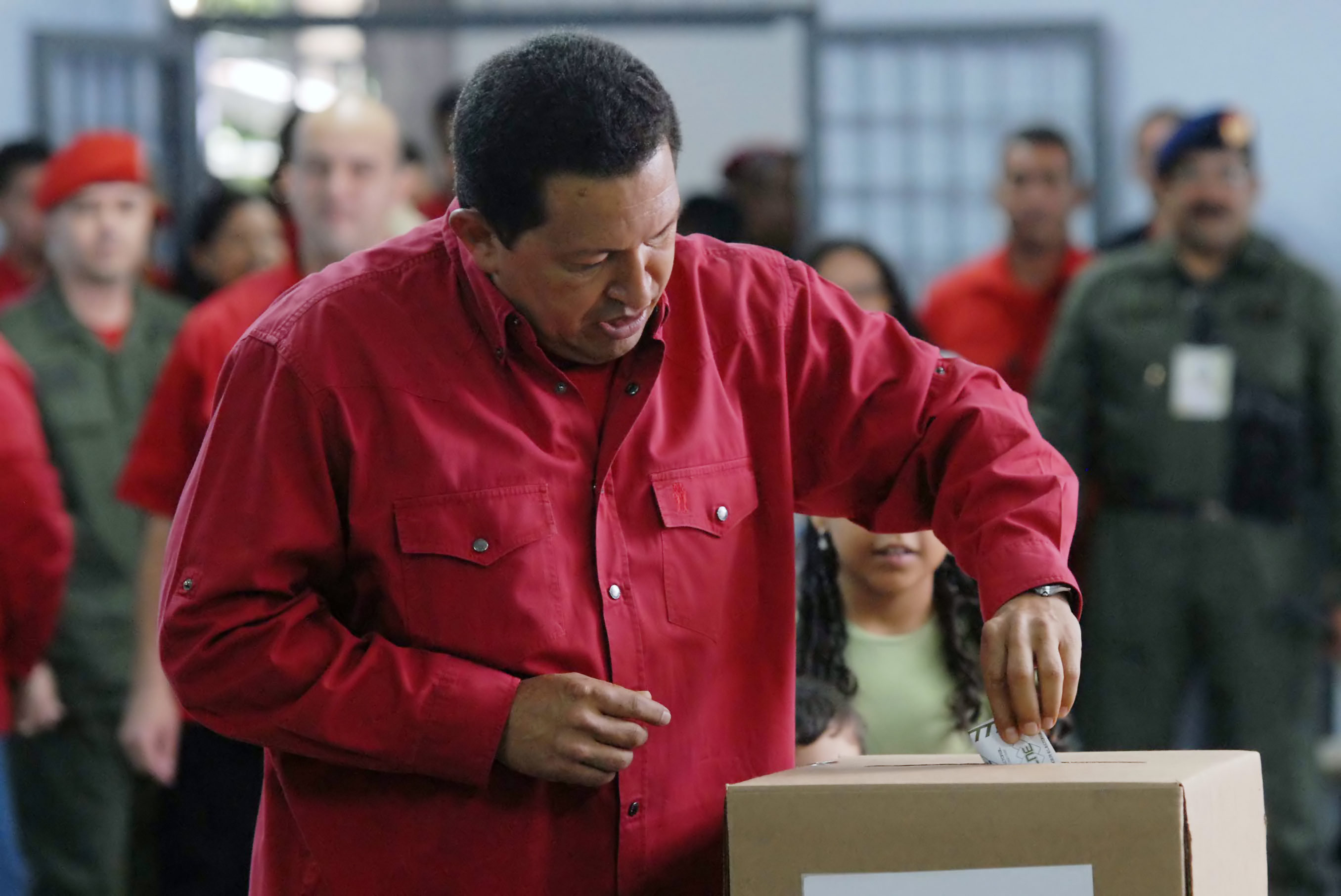
Hugo Chavez voting in 2007. (Wikimedia)
U.S. attempts to overthrow the Venezuelan government began far earlier than the Trump administration, however. Indeed, almost from the moment Chavez was elected in 1998, Washington started to plan for his removal. Through the NED, the U.S. began funding and training groups that would lead the April 2002 coup against Chavez, flying its leaders back and forth from Washington D.C. in the weeks leading up to the event. The U.S. telegraphed so clearly what would happen that Senators such as William Delahunt (D—MA) publicly sought reassurances that the U.S. would not support extralegal methods in removing Chavez.
On the day of the coup, the U.S. Ambassador to Venezuela was present at the coup headquarters in Caracas, while U.S. Army and Navy units were also involved in the actions. The coup eventually failed thanks to an enormous counter-protest surrounding the presidential palace and spurred loyal military units into retaking the building.
After the coup’s failure, NED funding for the groups involved more than quadrupled, and the U.S. government opened up an “Office of Transitions” in Caracas to help plan future actions.
The U.S. has attempted multiple failed efforts to dislodge the government, but none so spectacular as the 2014 guarimbas. The U.S. was the only country in the world not to recognize Maduro’s 2013 electoral victory, instead allying itself with far-right factions (including Machado’s) that implored people to take to the streets to “vent their anger.”
The resulting carnage terrorized the nation and led to an estimated $15 billion worth of damage. WikiLeaks cables show that the U.S. was bankrolling many of the movement’s leaders and that funding for such projects increased by 80 percent between 2012 and 2014. They planned to “divide” and “penetrate” the government’s supporter base by financing projects to undermine public confidence and promoting opposition parties. The cables also show that Washington knew the caliber of people they were employing. They note, for example, that Nixon Moreno had led a crowd to lynch the governor of Merida state during the 2002 coup and was accused of murder and the rape of a police officer.
Ultimately, the 2014 guarimbas petered out under the weight of their own popularity, but not before claiming dozens of lives.
A War Without Bombs

President Barack Obama in the Oval Office in 2015. (Official White House Photo by Pete Souza)
Unable to defeat socialism through electoral means or to engineer a successful coup d’etat, the United States moved to economic warfare to dislodge the government. The sanctions regime began in earnest under President Obama, who, in 2015, declared a state of emergency because of “the unusual and extraordinary threat to the national security and foreign policy of the United States posed by the situation in Venezuela.” To justify the unilateral coercive measures, successive presidents have maintained the state of emergency.
The sanctions have effectively cut Venezuela off from international trade and credit, with the U.S. threatening any entity that does business with Venezuelan firms with secondary sanctions or lengthy prison sentences. The goal of foreign sanctions, Washington has freely admitted, is to “decrease monetary and real wages, to bring about hunger, desperation and [the] overthrow of [the] government.”
The U.S. certainly achieved the former. Venezuela’s oil industry effectively collapsed, as did its ability to purchase food, medicines and other vital goods. The country’s income decreased by 99 percent, food became scarce, and inflation was rampant. An (American) United Nations special rapporteur who visited the country likened the situation to a Medieval siege, accusing the United States of crimes against humanity, and estimated that around 100,000 people had been killed.
The economic war led to an unprecedented exodus from the country, especially among those with in-demand transferable skills. Some 7 million Venezuelans — nearly one-quarter of the pre-sanctions population — left the country.
“Biden has just reimposed a sanctions regime on Venezuela that is much harsher than what Trump imposed in 2017. These are blatant acts of war that the U.S. would never tolerate on itself,” Emersberger told MintPress.
Emersberger also compared the Venezuelan situation with that of Nicaragua, where, after more than a decade of economic warfare against the anti-imperialist Sandinista government, Nicaraguans gave in. They voted for the U.S.-backed candidate, Violetta Chamorro:
The obvious U.S. strategy is to achieve the kind of fraudulent electoral victory it achieved in Nicaragua in 1990. Ongoing U.S. impunity means it can just stick with its criminal strategy indefinitely. The hope is that an exhausted populace eventually turns away from the targeted government in the hope of getting relief from Washington’s economic strangulation.”
The U.S. and its allies have also frozen Venezuelan assets abroad, including some $2 billion worth of gold held in the Bank of England and the U.S.-based petroleum company CITGO.
The U.S. even went so far as to kidnap Venezuelan diplomat Alex Saab as he was traveling back from a meeting in Iran, discussing how the two countries could aid each other in skirting the sanctions. Saab was held in the United States for more than three years. His rendition and imprisonment sparked little interest in the West.
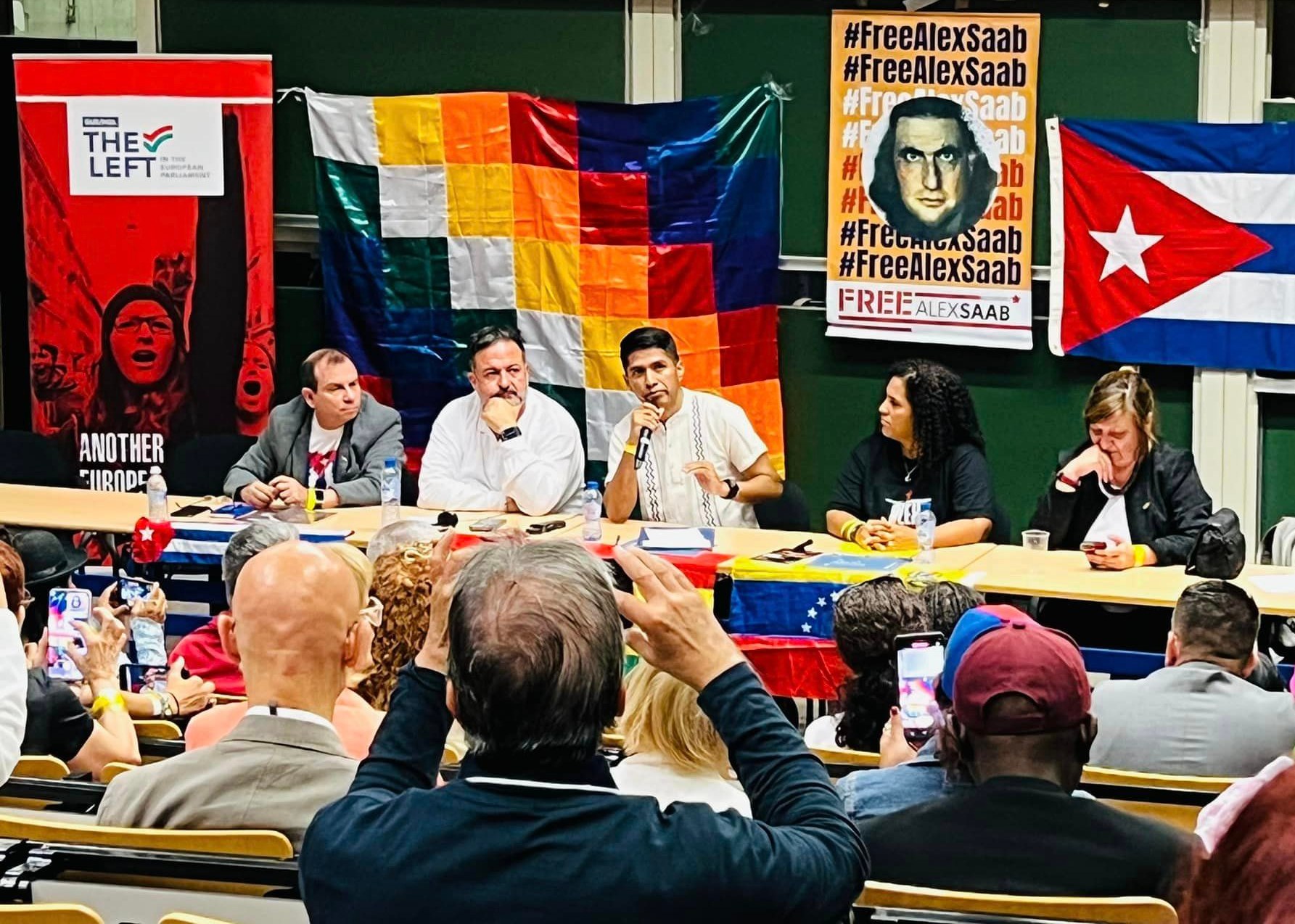
#FreeAlexSaab poster at a gathering of Latin American political leaders in Belgium, July 2023. (Cámara de Senadores – Asamblea Legislativa Plurinacional, Wikimedia Commons, CC BY 2.0)
Despite the years of hardship, there are signs that the worst might be over for Venezuela. “We have been steadily and slowly showing good economic indicators. We are about to reach 12 quarters of consecutive GDP growth. We went out of the hyperinflation in January 2022, and last week our Central Bank reported a May inflation of 1.5 percent for that month (the lowest in 20 years),” Jesus Rodriguez-Espinoza, editor of The Orinoco Tribune and a former diplomat, told MintPress. Nevertheless, he cautioned that the economy is still nowhere near its pre-sanctions level of 2013.
Despite U.S. economic measures, the government has maintained a support base by housing and feeding the people. Since 2013, it has built 5 million public housing units for a country of only 28 million people and now produces 97 percent of all food consumed in the country.
Media Attack
Western corporate media, which strongly supported U.S. coup attempts against Venezuela, have been hyping González’s chances. Citing data from notoriously unreliable polling firms, Bloomberg told readers González was by far Venezuelans’ top choice.
Nevertheless, they have hedged their bets, preparing readers for a shock by informing them that if Maduro wins, it will be because of election cheating. The Associated Press claimed, “People loyal to the ruling party control all branches of Venezuela’s government, and public employees are constantly pressured to participate in demonstrations.” CNN said that Maduro would rig the elections. The New York Times insisted that the local media (much of which is sponsored by the U.S. government) was in Maduro’s pocket. It added that if Maduro does win, it will only “intensify poverty” in the country – a statement that could be read as a threat.
Professor Ellner was far from impressed with the U.S. press coverage. “True to form, the corporate media has completely left key issues out of their reporting on Venezuela’s upcoming elections,” he told MintPress, adding, “The biggest violator of the very essence of democracy is not Maduro, but the U.S. Washington will penalize Venezuelans if they don’t elect the candidate it openly supports.”
A New Wave
Venezuela is at the forefront of Latin American support for Palestine. A new wave of progressive governments have taken a stand and defied orders from Washington, distancing themselves from the Israeli attack.
Thanks to these governments, Maduro and Venezuela find themselves significantly less isolated than even a few years ago. The return of President Lula da Silva and the Workers’ Party in Brazil has meant Caracas has regained a critical regional ally. The populist government in Mexico has continued to support Venezuela. And perhaps most importantly, Gustavo Petro’s 2022 electoral victory has turned Colombia from an overtly hostile neighbor and a staging post for coups into a soft ally.
If Maduro and his socialist coalition can win next month, it will solidify a leftward trend in Latin American politics, something the U.S. is desperate to quash. Washington has long regarded Venezuela as a cornerstone of the anti-imperialist movement in Latin America, understanding that if it is allowed to flourish, the virus of independence might spread to the rest of the continent and beyond.
It is for that reason that the U.S. government has invested so much into training a domestic opposition, funding political parties, attempting coups and carrying out economic warfare against Venezuela. Yet it has, so far, been unsuccessful. In the face of all the U.S. meddling, a win for Maduro next month would be another serious black eye for Uncle Sam.
Alan MacLeod is Senior Staff Writer for MintPress News. After completing his PhD in 2017 he published two books: Bad News From Venezuela: Twenty Years of Fake News and Misreporting and Propaganda in the Information Age: Still Manufacturing Consent, as well as a number of academic articles. He has also contributed to FAIR.org, The Guardian, Salon, The Grayzone, Jacobin Magazine, and Common Dreams.
This article is from MintPress News, MPN.news, an award winning investigative newsroom. Sign up for their newsletter.
Views expressed in this article and may or may not reflect those of Consortium News.
Please Donate to the
Spring Fund Drive!



Too bad the job of guiding Venezuela’s future is not being left to the Venezuelans.
Of course, as long as there is a United States of America this decision, or a hundred more like it, will always be claimed as one more Yankee prerogative.
thank you for your detailed outline
of the the same-old-shame-old:
greed, hypocrisy, double standardry, utter
contempt for humanity at work, relentlessly.
and with a vengeance.
Apparently, the US can interfere all it likes in countries to its south, but Russia is required to be hands off in Ukraine, regardless of hostile actions against the Russian population in the Donbas. Double standards are us. This all comes down to the capitalist banking class that sees the entire planet as its own property to exploit as it sees fit. They need serious comeuppance from the BRICS. Sooner rather than later.
Meddlers R U.S.!
Of course the USA doesn’t want a “Socialist” government anywhere in the world because Socialist governments (as the name implies) work for the PEOPLE not for the greedy…
US foreign policy operates like a gigantic mafia. The BRICS is the best, and perhaps only, chance to reduce the mafia’s power to interfere in elections around the world. To support this goal, the BRICS announced last week that it is not going to take in any new members this year, but would take in”Partners” which are put on a path to membership. The key to full membership will be that a new member will have to pledge to NOT honor new US sanctions against any BRICS member. It was a startling announcement. Apparently all current full members are on board with this new membership requirement. Saudi Arabia has not joined as a full member, but remains active as a Partner. Game changer is over used, but IF BRICS can expand, with this condition attached, to include the likes of Indonesia, Malaysia, Thailand, Vietnam etc., it definitely could break the mafia ability to effectively sanction countries. A very interesting 18 to 24 months ahead. A full multi polar world still seems inevitable.
It is hard to live anywhere in Latin America without feeling the hubris of the USA looming over you ready to crush at the slightest “offense” to the “rules based order” of the masters of the hemisphere. As an expat in Ecuador, I see desperate Venezuelans who were it not for the USA misery imposed on their country would not be leaving in desperation. Of course, many flood to the USA, but its a “border problem” not a sanctions failure. USA–Unlimited Suffering Abroad.
From Anya Parampil’s “Corporate Coup” Chapter 14:
I would have quoted it, but even the Author admits this part of the book might “glaze the eyes and mind”
In 2002 Canadian mining firm Crystallex, signed for the rights to exploit the Venezuelan gold deposit at Las Cristinas.
Venezuela didn’t sign final approval for the mine after the bankers crashed the economy in 2008.
Crystallex sued for $3.16 Billion in “damages” for a mine they never opened, in the Washington DC based International Center for Settlement of Investment Disputes tribunal (ICSID). The ICSID being a neoliberal kangaroo court for prosecution of the “Global South” sided with Crystallex for $1.2 Billion, and so ordered Venezuela to pay.
Venezuela told them, by not paying, to pound sand.
After Trump decreed Guaido fake president (Jan. 2019). Fake president Guaido’s new fake “Attorney General” Jose Ignacio Hernandez “lifted the corporate veil” on Citgo, a subsidiary of Venezuela’s state oil company Petroleos de Venezuela. Paving the way in July 2019, for a Delaware court to rule Crystallex could steal the $1.2 Billion from Citgo via a fire sale of their infrastructure to US oil companies.
In other words, Trump appointed fake president Guaido’s,fake attorney general Hernandez stole his own country’s assets on behalf of neoliberals in the US and Canada.
A Corporate Coup, organized crime as an art form.
And Anya describes that he’s responsible for the theft of another $15 Billion from Petroleos de Venezuela itself.
An epiphany today.
Not to lay bare how slow I am. But this is the nuts and bolts of Imperialism today.
Anya Parampil in one of her book promotion videos said that what she learned when writing this book, is that it was the “model” of current US foreign policy (Imperialism)
The not so venerable Hernandez above, was mentored by Ricardo Hausmann, the neoliberal director of Harvard’s Center for International Development’s Growth Lab.
These scumbags come out of places like the World Economic Forum’s “Young Global Leaders”. The Harvard Kennedy School etc.. and go back to their country of origin and rape it in the name of neoliberalism.
Right out in the open.
This has to be why Elensky (he outlawed the letter Z) is still fake president of Ukraine. Whatever soulless nexus is responsible for facilitating the rape of Ukraine by Larry Fink’s Blackrock might fragment if power changed hands. A new president might expropriate the arable land, minerals and whatever else Blackrock has stolen. It also explains “Putin is a madman” and all that BS. They can’t let Putin take Blobrock’s lucre. Not because any of these people care about what some say might be a million dead Ukrainians at this point.
It also explains the only meaningful difference between Democrats and Republicans.
“NO, you can’t rape Eastern Europe, that’s mine, you go to Latin America.”